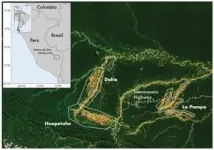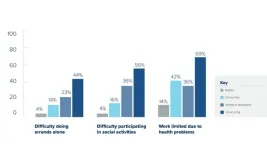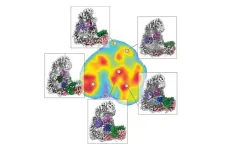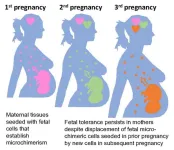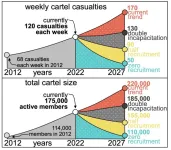(Press-News.org) Artisanal and small-scale gold mining is a lifeline for many who live in Madre de Dios, a region in southeastern Peru, where poverty is high and jobs are scarce. But the economic development in this part of the Amazon basin comes at a cost, as it causes deforestation, build up of sediment in rivers, and mercury contamination in nearby watersheds, threatening public health, Indigenous peoples, and the future of the biodiversity hotspot. And much of the mining activity is unauthorized.
Seeking to eliminate illegal artisanal and small-scale gold mining activity and its many negative impacts, the Peruvian government deployed “Operation Mercury” (Operation Mercurio) in February 2019 in the La Pampa region, an area where gold mining is banned in most places. La Pampa straddles the Interoceanic Highway. North of the highway, mining is mostly legal in mining concessions. However, south of the highway mining is strictly prohibited in the buffer zone of the Tambopata National Reserve.
Through Operation Mercury, armed military and national police were dispatched to the region and had a sustained presence until March 2020. Miners were evicted and mining equipment was destroyed. The intervention was successful in stopping illegal gold mining activity in La Pampa but activity in legal areas spiked, triggering many of the same environmental concerns, according to a Dartmouth-led study. The results are published in Conservation Letters, a journal of the Society for Conservation Biology.
“Although illegal gold mining operations in La Pampa came to a near halt during Operation Mercury’s two intervening years (2019-2020), mining activity essentially just shifted across the road to legal areas on the other side of the Interoceanic Highway,” says lead author Evan Dethier, an assistant professor at Occidental College, who conducted the study while he was a postdoctoral fellow at Dartmouth.
Following Operation Mercury, mining decreased by 70% to 90%. Excavated mining pits (“mining ponds”) in illegal mining areas decreased by up to 5% per year as compared to increasing by 33% to 90% per year before the intervention. Although deforested areas experienced revegetation at a rate of 1 to 3 square kilometers per year, progress was offset by increases in deforestation in legal mining areas north of the Interoceanic Highway at a rate of 3 to 5 square kilometers per year. Most of the revegetation occurred on the edges of deforested areas, with the highest revegetation in La Pampa south. Mining pond areas outside intervention zones also saw increases ranging from 42% to 83%
“The spillover effect in areas near the intervention zone demonstrates that stronger regulations are also needed in legal gold mining areas, to help mitigate the environmental effects,” says Dethier. “But this intervention did have some of the intended effects, limiting mining in a protected area for a sustained period.”
To assess Operation Mercury’s impact on mining activity, the research team drew on satellite data from 2016 to 2021 from the European Space Agency’s Sentinel-1 and Sentinel-2. Data were obtained from nine mining areas: four illegal mining areas targeted by the intervention, two legal areas to the north on the other side of the Interoceanic Highway, and three distant sites that were not part of the enforcement, which served as a control for the study. Using the radar and multispectral data, the researchers were able to quantify changes in water, water quality, mining pond areas, and deforestation in La Pampa following Operation Mercury, by comparing data from before, during, and after the intervention.
As part of the analysis, the team examined the spectral properties of the mining ponds and changes in pond color. Mining ponds typically take on a yellow color, which acts as a marker for gold mining activity. The “yellowness” of the ponds is associated with increases in suspended sediment in the water, according to prior research led by Dethier.
Through gold mining processes, sediment is churned up from the land, creating turbid water with lower reflectance levels, while clearer water has higher reflectance. After Operation Mercury was implemented, reflectance increased in mining ponds in La Pampa south but then stabilized.
Following Operation Mercury, pond yellowness decreased rapidly after mining activity was suspended in all areas of La Pampa, except in the north. In La Pampa northwest, mining activity spiked and pond yellowness increased by 43%, as compared to before the intervention. In La Pampa northeast, yellowness remained stable due to continued mining activity.
“Like many other countries around the world with highly prized natural resources, with Peru’s rich deposits of gold, it has had to determine who controls this extractable resource and how this particular mining sector will be formed,” says co-author David A. Lutz, a research assistant professor in the Department of Environmental Studies at Dartmouth.
By January 2023, when this paper was under review by the journal, illegal gold mining had resumed in protected areas, as enforcement and anticorruption activities by the military and national police had ceased, once they were redeployed to focus on the COVID-19 pandemic.
“Our results demonstrate how intervention at the federal level can effectively stop illegal mining in Peru,” says Dethier. “But that is just one aspect of the problem, as a multifaceted approach is necessary to address the long-term impacts of both illegal and legal gold mining activity on humans, wildlife and the environment in the Madre de Dios watershed.”
Dethier says that “strong governance and conservation and remediation strategies are needed to protect this tropical biodiversity hotspot. And, as we continue to show in our related work, this challenge is a global phenomenon.”
Dethier, Lutz, and others just published a related study that showed the rise of similar mining operations in 49 countries across the global tropics. They showed that as much as 7% of large tropical rivers have been degraded by these expanding mining operations.
Dethier (evan.nylen.dethier@dartmouth.edu) and Lutz (david.a.lutz@dartmouth.edu) are available for comment. Miles Silman at Wake Forest University, Luis Fernandez at Wake Forest University and the Centro de Innovación Científica Amazónica (CINCIA), and Jorge Espejo and Paúl Pauca at Servicio Nacional de Áreas Naturales Protegidas por el Estado in Peru, also served as co-authors of the study.
###
END
Peru’s Operation Mercury stopped most illegal gold mining in one biodiversity hotspot in the Amazon. Then the COVID-19 pandemic hit.
Deforestation and water quality improved following intervention in the Madre de Dios Region of the Amazon
2023-09-21
ELSE PRESS RELEASES FROM THIS DATE:
Texas A&M-led humanities project seeks to preserve an endangered language
2023-09-21
Texas A&M University historian Dr. Daniel Schwartz has devoted the last decade of his professional life to preserving the past — specifically, the culture of a 2,000-year-old language known as Syriac. He and likeminded colleagues from around the world have been working across place, time and cyberspace to safeguard Syriac cultural heritage, painstakingly creating Syriaca.org, a cyberinfrastructure to link Syriac literature to their persons, places, manuscripts and key concepts.
This spring, they received another big assist from the National ...
Cancer Prevention and Research Institute of Texas awards $2 million grant to SMU
2023-09-21
DALLAS (SMU) – The Cancer Prevention and Research Institute of Texas (CPRIT) has awarded $2 million to recruit Annika Wylie to SMU and fund five years of her research, which focuses on the p53 gene, a naturally occurring tumor suppressor.
CPRIT is the state agency mandated to create and expedite innovation in the area of cancer research and enhance the potential for a medical or scientific breakthrough in both prevention and cures. CPRIT is now a $6 billion, 20-year initiative – the largest state cancer research investment ...
Study shows millions of people live with co-occuring chronic pain and mental health symptoms
2023-09-21
New University of Arizona Health Sciences research recently published in the journal PAIN found that nearly 1 in 20 adults in the U.S. experience the co-occurrence of chronic pain and anxiety or depression, resulting in functional limitations in daily life.
Prior research has shown that chronic pain along with symptoms of anxiety or depression are biologically linked. This study is one of the few to examine the national prevalence of chronic pain with anxiety or depression symptoms in adults. The results shed light on the fact that millions ...
Cardiovascular organizations pursue new, independent medical board
2023-09-21
Many of the nation’s most prominent cardiovascular organizations, representing tens of thousands of physicians, unite today to pursue the creation of a new Board for cardiovascular medicine. The proposed new Board would be independent of the American Board of Internal Medicine, where the cardiology certification process currently exists. Collectively, the American College of Cardiology (ACC), Heart Failure Society of America (HFSA), Heart Rhythm Society (HRS) and Society for Cardiovascular Angiography & Interventions (SCAI) are working together to submit a ...
Skipping counseling doesn't raise cancer gene test distress
2023-09-21
Skipping genetic counseling before or after taking a remote screening of inherited risk for ovarian or breast cancer does not increase distress, anxiety or depression, according to a study published Sept. 14 in JAMA Oncology.
“The accepted idea was that you needed genetic counseling before taking a genetic test,” said Dr. Elizabeth Swisher, a gynecologic oncologist at UW Medicine and professor of obstetrics and gynecology at the University of Washington School of Medicine. “But we’re finding out that many of these protocols actually represent ...
Nanoparticle vaccine candidate shows promise against emerging tick-borne virus in early studies
2023-09-21
Cleveland Clinic researchers have used nanoparticles to develop a potential vaccine candidate against Dabie Bandavirus, formerly known as Severe Fever with Thrombocytopenia Syndrome Virus (SFTSV), a tick-borne virus that currently has no prevention, treatment or cure.
The patent-pending vaccine uses nanoparticles to carry the antigens that contain instructions for fighting off a virus. Nanoparticle vaccines are designed to effectively deliver antigens at a lower dose with fewer side effects for at-risk ...
University of Minnesota Medical School assistant professor, research team awarded $1 million grant to improve access to legal advocacy for rural and Indigenous communities
2023-09-21
MINNEAPOLIS/ST. PAUL (09/21/2023) — Michele Statz, PhD, an assistant professor at the University of Minnesota Medical School, Duluth Campus and affiliated faculty with the University of Minnesota Law School’s Human Rights Center, and her research team have been awarded a $1 million grant from the National Science Foundation’s CIVIC Innovation Challenge to improve access to civil justice for rural and Indigenous communities in Alaska. The research team aims to develop a model that can be replicated in other communities across the country.
The “Bridging the Rural Justice Gap: Innovating & Scaling Up Civil Access to Justice in Alaska” ...
Scientists reveal intricate mechanisms cells use to build protein destruction signals
2023-09-21
Within the intricate molecular landscape inside of a cell, the orchestration of proteins demands precise control to avoid disease. While some proteins must be synthesised at specific times, others require timely breakdown and recycling. Protein degradation is a fundamental process that influences cellular activities such as the cell cycle, cell death, or immune response. At the core of this process lies the proteasome, a recycling hub in the cell. The proteasome degrades proteins if they carry a molecular tag formed by a chain of ubiquitin molecules. The task of attaching this tag falls to enzymes known as ubiquitin ligases.
This process, known ...
Moms’ ability to ‘remember’ prior pregnancies suggests new strategies for preventing complications
2023-09-21
Scientists have known for decades that pregnancy requires a mother’s body to adjust so that her immune system does not attack the growing fetus as if it were a hostile foreign invader. Yet despite learning a great deal more about the immunology of pregnancy in recent years, a new study shows that the cellular crosstalk between a mother and her offspring is even more complex and long-lasting than expected.
The study was published online Sept. 21, 2023, in the journal Science by a research team led by Sing Sing Way, MD, PhD, Division of Infectious Diseases at Cincinnati Children’s and the Center ...
Curbing violence in Mexico: Disrupting cartel recruitment holds the key, a new study finds
2023-09-21
Not through courts and not through prisons. The only way to reduce violence in Mexico is to cut off recruitment. Increasing incapacitation instead leads to both more homicides and cartel members, researcher Rafael Prieto-Curiel from the Complexity Science Hub and colleagues show in a study in Science.
In 2021, approximately 34,000 people died from intentional homicides in Mexico – the equivalent of nearly 27 victims per 100,000 population. This ranks Mexico among the least peaceful countries worldwide.
FIFTH LARGEST EMPLOYER
In order to be able to address this violence ...
LAST 30 PRESS RELEASES:
Genetic risk for mental illness is far less disorder-specific than clinicians have assumed, massive Swedish study reveals
A therapeutic target that would curb the spread of coronaviruses has been identified
Modern twist on wildfire management methods found also to have a bonus feature that protects water supplies
AI enables defect-aware prediction of metal 3D-printed part quality
Miniscule fossil discovery reveals fresh clues into the evolution of the earliest-known relative of all primates
World Water Day 2026: Applied Microbiology International to hold Gender Equality and Water webinar
The unprecedented transformation in energy: The Third Energy Revolution toward carbon neutrality
Building on the far side: AI analysis suggests sturdier foundation for future lunar bases
Far-field superresolution imaging via k-space superoscillation
10 Years, 70% shift: Wastewater upgrades quietly transform river microbiomes
Why does chronic back pain make everyday sounds feel harsher? Brain imaging study points to a treatable cause
Video messaging effectiveness depends on quality of streaming experience, research shows
Introducing the “bloom” cycle, or why plants are not stupid
The Lancet Oncology: Breast cancer remains the most common cancer among women worldwide, with annual cases expected to reach over 3.5 million by 2050
Improve education and transitional support for autistic people to prevent death by suicide, say experts
GLP-1 drugs like Ozempic could cut risk of major heart complications after heart attack, study finds
Study finds Earth may have twice as many vertebrate species as previously thought
NYU Langone orthopedic surgeons present latest clinical findings and research at AAOS 2026
New journal highlights how artificial intelligence can help solve global environmental crises
Study identifies three diverging global AI pathways shaping the future of technology and governance
Machine learning advances non targeted detection of environmental pollutants
ACP advises all adults 75 or older get a protein subunit RSV vaccine
New study finds earliest evidence of big land predators hunting plant-eaters
Newer groundwater associated with higher risk of Parkinson’s disease
New study identifies growth hormone receptor as possible target to improve lung cancer treatment
Routine helps children adjust to school, but harsh parenting may undo benefits
IEEE honors Pitt’s Fang Peng with medal in power engineering
SwRI and the NPSS Consortium release new version of NPSS® software with improved functionality
Study identifies molecular cause of taste loss after COVID
Accounting for soil saturation enhances atmospheric river flood warnings
[Press-News.org] Peru’s Operation Mercury stopped most illegal gold mining in one biodiversity hotspot in the Amazon. Then the COVID-19 pandemic hit.Deforestation and water quality improved following intervention in the Madre de Dios Region of the Amazon

